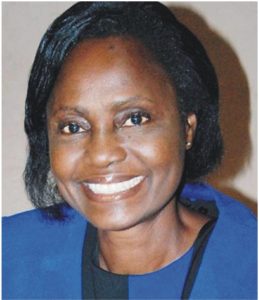
The chairman of African Maritime Forum Limited and Transport , Energy and Investment lawyer at Thorpe and Associates, Oritsematosan Edodo-Emore, has said Nigeria is making progress in guarding it’s territorial waters by the activities of the Navy , Marine Police, Nigerian Maritime Administration and Safety Agency (NIMASA) and private organizations but a review of legislation needs to be done to avoid overlap of functions.
She made the statement while delivering her paper on the topic ‘Promoting Maritime Safety in Nigeria’s Territorial Waters : Issues and Prospects’ at the 2024 4th Quarter Maritime Lecture which lasted from 4th to 6th November at the Maritime Academy of Nigeria Oron, Akwa Ibom state.
Edodo-Emore emphasized that though the country is a developing nation and work in progress, Nigeria must continue to improve on current steps to promote maritime safety and security in her territorial waters which contains wealth creation substances.
” The safety and security of waters is for Economic stability and exploitation of natural resources.
“In Nigeria’s territorial waters there exists significant living and nonliving things ,oil and gas deposits and installations, fish and marine life. 80% of the National budget is based on revenue from oil and gas and 90% of Nigeria’s import and export are carried by sea.”
She further informed that the chief law enforcer at sea is the Navy and they enforce Customs laws, fishery and immigration laws and fight against bunkering. She said maritime offences include armed robbery at sea, seizing a ship by force or receiving ransom and there are national and international laws to which Nigeria ascribes to .
According to her, ” Section 31 of the Cabotage Act 2003 states that officers may stop, board and detain a vessel or crew if he believes on reasonable grounds that the Cabotage Act has been contravened and Section 3 (3) (d) Cabotage Act also states that while exercising enforcement powers, assistance of the Navy be enlisted”
Edodo-Emore recalled that the NIMASA Deep Blue Project which was launched on 10th June, 2021 for integrated national security and water protection system made provision for two special mission vessels, 17 fast interceptor boats ,two special mission aircraft for surveillance of the Exclusive Economic Zone (EEZ ), 3 special mission helicopters for search and rescue and four unmanned Aerial vehicles.
Also speaking at same event a Senior Legal Officer at Presidency, Barrister Kioba Anabraba, has stated that to effectively address the abuse of power in academic institutions in relation to sexual harassment and grade manipulation, a multifaceted approach is essential.
During the 2024 4th Quarter Maritime Lecture Series held at Maritime Academy of Nigeria Oron, Akwa Ibom, on 4th to 6th of November 2024, she explained that both sexual harassment and grade manipulation are forms of academic corruption and it constitutes violence against a target.
Anabraba who spoke on ‘ Abuse of Power in Institutions: The Intersection of Sexual Harassment and Grade Manipulation’ advised that to deal with these problems, institutions should develop comprehensive policies that clearly outline definitions, reporting procedures and consequences for violations as independent review bodies with students representation should be established to ensure that allegations are taken seriously and investigated thoroughly.
Anabraba added that it is crucial to enforce existing legal frameworks and conduct educational workshops to inform students and staff of their rights and available resources while implementing a safe anonymous reporting platforms or channels will protect students from retaliation as it will encourage more individuals to come forward.
Furthermore she said promoting gender equality in leadership roles and establishing mentorship programs can contribute to a safer, more inclusive academic environment.She affirmed that these measures will help foster respect, integrity and equality in the Academy.
“Any institution where sexual harassment and grade manipulation thrives is a direct attack on the society and in the long run diminishes the society’s confidence in such institution irreparably”
Barr. Anabraba informed that there are several laws in Nigeria prohibiting sexual harassment and bribery. She also cited cases of sexual harassment in Nigeria institutions and how they were handled.
“A bill for an Act to prevent, prohibit and redress sexual harassment of students in tertiary educational institutions and for matters connected was first introduced in 2016 during the time of the 8th National Assembly and reintroduced in 2019 during the 9th Assembly after the World Bank report of 2018 stated that 70% of female students in Nigerian institutions have experienced some form of sexual harassment, primarily from lecturers and classmates.
“Although the Bill was opposed by the leadership of the Academic Staff Union of Universities (ASUU) , it was passed in 2021 but yet to receive the assent of the president.
“The bill seeks to protect and prevent sexual harassment of students by educators in tertiary institutions” she said.
She announced to the student of the Academy that those that can report cases of sexual harassment and ‘money for marks’ in tertiary institutions include a complainant, any member of the institution, any supervisor or other person to whom a report has been made and any person who becomes aware that sexual harassment or assault has taken place or there is a demand for or offer of bribe.
The Acting Registrar of the Academy, Netson Peter , who represented the Rector, Commodore Duja Effedua, appreciated the guest lecturers and urged the cadets to speak out when they detect cases of sexual harassment and manipulation of grades. He affirmed that the Rector has zero tolerance for the offences.
“On behalf of the Rector, management, staff and cadet of the Academy, I sincerely thank our guest speakers for their presentations.
“Cadet speak out when you discover these issues. The Rector has raised a standard of the Academy against sexual harassment and grade manipulation and we will make sure we sustain the standard.
“We don’t tolerate sexual harassment, gratification and manipulation of grade. It is on record that we have terminated appointments of staffs as a result of these.
Those that were suspected but weren’t caught red-handed were transferred from their departments.”











